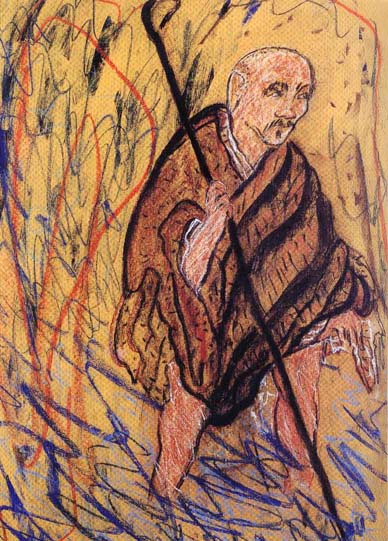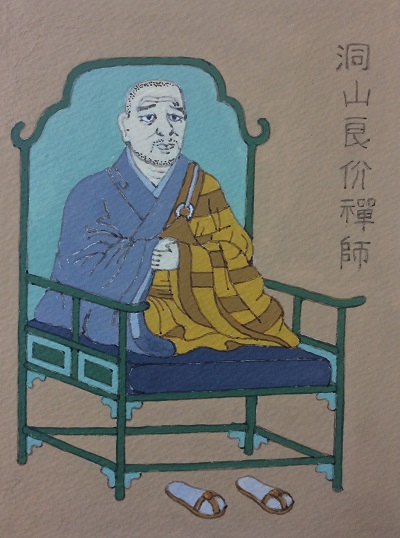ZEN IRODALOM ZEN LITERATURE
« Zen főoldal
« vissza a Terebess Online nyitólapjára
洞山良价 Dongshan Liangjie (807-869)

Portrait by R. Vendetti
寶鏡三昧(歌)
Baojing sanmei(ge)
(Rōmaji:) Tōzan Ryōkai: 宝鏡三昧 Hōkyō zanmai(ka)
(English:) Song of Precious Mirror Samadhi / Most Excellent Mirror Samadhi / Jewel Mirror Samādhi
(Magyar átírás:) Tung-san Liang-csie: Paocsing szanmej(ko): Kincstükör szamádhi
五位偏正 Wuwei pianzheng
(Rōmaji:) Goi hensho
(English:) The Five Ranks / The Five Relations Between Particularity and Universality / Five Juxtaposing Opposites / Biased and Right Five Positions
(Magyar átírás:) Vu-vej pien-cseng > Tung-san Liang-csie: Az öt rang
瑞州洞山良价禪師語錄 Ruizhou Dongshan Liangjie chanshi yulu
(Rōmaji:) Zuishū Tōzan Ryōkai zenji goroku
(English:) The Record of Liang-chieh of Tung-shan in Jui-chou
(Magyar átírás:) Zsuj-csou Tung-san Liang-csie csansi jülu / Tung-san csan mester mondásai
Tartalom |
Contents |
|
Tung-shan Liang-chieh: Zen tükör Az öt fokozat Az ékköves tükör szamádhi dala Tung-san Liang-csie: Az öt rang Tung-san csan mester mondásai Tung-san Liang-csie verse . . . . .
. . , |
The Record of Liang-chieh of Tung-shan PDF: Just this is it: Dongshan and the practice of suchness Encounter Dialogues of Dongshan Liangjie JPG: Tung-shan Liang Chieh Tung-shan Liang-chieh: Founder of the Ts'ao-tung House Dialogues of Tung-shan Song of Focusing the Precious Mirror Song of the Jewel Mirror Samadhi Hōkyōzanmai Jewel Mirror Samadhi Precious Mirror Samadhi Seal of the Precious Mirror Samadhi The Most Excellent Mirror―Samādhi The Song of the Precious Mirror Samadhi Song of the Jewel Mirror Awareness JPG: Jewel Mirror Samadhi Translation Study "Dongshan and the Teaching of Suchness" by Taigen Dan Leighton The Five Ranks PDF: Dongshan's Five Ranks: Keys to Enlightenment PDF: Dongshan Liangjie: Awakening Through the Sight of His Reflection, pp. 170-179. 指月慧印 Shigetsu Ein (1689–1764) |
![]()

Dongshan Liangjie (gouache) by Kokyo Henkel
PDF: Dongshan’s Five Positions of the Apparent and the Real
The Five Ranks
Translated by Heinrich Dumoulin
Zen Buddhism: A History, Macmillan, 1994, Volume 1. pp. 222-230.
Visual Schematics and Symbolism of the Five Ranks
In the third watch of the night
Before the moon appears,
No wonder when we meet
There is no recognition!
Still cherished in my heart
Is the beauty of earlier days.
A sleepy-eyed grandma
Encounters herself in an old mirror.
Clearly she sees a face,
But it doesn't resemble her at all.
Too bad, with a muddled head,
She tries to recognize her reflection!
Within nothingness there is a path
Leading away from the dusts of the world.
Even if you observe the taboo
On the present emperor's name,
You will surpass that eloquent one of yore
Who silenced every tongue.
When two blades cross points,
There's no need to withdraw.
The master swordsman
Is like the lotus blooming in the fire.
Such a man has in and of himself
A heaven-soaring spirit.
Who dares to equal him
Who falls into neither being nor non-being!
All men want to leave
The current of ordinary life,
But he, after all, comes back
To sit among the coals and ashes.
The Five Ranks
Translated by Thomas Cleary
Classics of Buddhism and Zen. The Collected Translations of Thomas Cleary,
Boston, MA: Shambhala, Volume Three. pp. 297-305.
I: The Relative within the Absolute
In the third watch,
beginning of the night,
before the moon is bright,
do not wonder
at meeting without recognition;
still held hidden in the heart
is the beauty of former days.
A woman who's overslept
encounters an ancient mirror;
clearly she sees her face-
there is no other reality.
Nevertheless, she still mistakes
her reflection for her head.
Within nothingness is a road
out of the dust;
just be able to avoid violating
the present taboo name
and you will surpass
the eloquence of yore
that silenced every tongue.
When two blades cross,
no need to flee;
an expert is like
a lotus in fire-
clearly there is a spirit
spontaneuosly soaring.
If you are not trapped
in being or nonbeing,
who can dare to join you?
Everyone wants to leave
the ordinary current,
but in the final analysis
you come back
and sit in the ashes.
Gāthā of the Five Ranks, the Lords and Vassals
Translated by William F. Powell
Record of Tung-shan Liang-chieh. Honolulu: University of Hawaii Press, 1986. pp. 61-62.
Phenomena within the real:
At the beginning of the night's third watch, before there is moonlight,
Don't be surprised to meet yet not recognize
What is surely a familiar face from the past.
The real within phenomena:
An old crone, having just awakened, comes upon an ancient mirror;
That which is clearly reflected in front of her face is none other than her own likeness.
Don't lose sight of your face again and go chasing your shadow.
Coming from within the real:
Amidst nothingness there is a road far from the dust.
If you are simply able to avoid the reigning monarch's personal name,
Then you will surpass the eloquence of previous dynasties.
Going within together:
Two crossed swords, neither permitting retreat:
Dexterously wielded, like a lotus amidst fire.
Similarly, there is a natural determination to ascend the heavens.
Arriving within together:
Falling into neither existence nor nonexistence, who dares harmonize?
People fully desire to exit the constant flux;
But after bending and fitting, in the end still return to sit in the warmth of the coals.
偏正五位說 Pianzheng wuwei shuo
Exposition on the Biased and Right Five Positions
written by Dongshan Liangjie (洞山良价 : 807–869) of the Cao-Dong School,
which was annotated by his disciple Caoshan Benji (曹山本寂 : 839–869)
The World of Shih & Li of Tung-Shan
From: Original Teachings of Ch'an Buddhism by Chang Chung-Yuan. Vintage Books, 1971, p. 53.
Fourfold Dharmadhatu of Hua-Yen
1. The world of Shih (events)
Five Relations Between Universality and Particularity of Tung-Shan
Particularity in Universality > Subjectivity
Universality in particularity > Objectivity
When one stays in the centre of the market and is ready to engage in all kinds of work at any time, he is entitled to receive thirty blows, because he neglects the cultivation of li, or reality, or non-action. (Wan-Ju T'ung-Che)
Fourfold Dharmadhatu of Hua-Yen
2. The world of Li (reality)
Five Relations Between Universality and Particularity of Tung-Shan
Enlightenment emerging from universality
Non-action (from which action emerges)
When one stays on top of the solitary peak and gazes at the sky, he may swallow all the Buddhas, past, present and future, in one gulp, but he will neglect the all-sentient beings. He should also be given thirty blows because he neglects shi, or action. (Wan-Ju T'ung-Che)
Fourfold Dharmadhatu of Hua-Yen
3. The world of Li and Shih perfectly interfused
Five Relations Between Universality and Particularity of Tung-Shan
Enlightenment emerging from particularity
Interfusion of action and non-action
One stays on top of the solitary peak gazing at the sky, yet he is in the centre of the market engaged in all kinds of work. One is in the center of the market engaged in all kinds of work and yet he stays on top of the solitary peak, gazing at the sky. If these two men come to me I will have nothing to offer them. (Wan-Ju T'ung-Che)
Fourfold Dharmadhatu of Hua-Yen
4. The world of perfect mutual solutuion between Shih and Shih
Five Relations Between Universality and Particularity of Tung-Shan
Enlightenment achieved between universality and particularity
Absolute freedom from both action and non-action
Cf.Tozan Ryokai's Five Ranks of the Apparent & the Real
Hakuin's commentary on the Five Ranks
http://www.kaihan.com/fives.htmhttp://en.wikipedia.org/wiki/Verses_of_the_Five_Ranks
http://history.cultural-china.com/en/164History14552.html
指月慧印 Shigetsu Ein (1689–1764)
THE THREE ROADS OF TUNG SHAN
(The following explanation is taken from Shigetsu Ein's
Funogo san ro, da, shi i rui, a 'Non-talk on the three roads,
(three) falls, and four different kinds' (1761). Shigetsu was a
Soto Zen master, a Japanese descendant of Ts'ao-Tung Ch'an.)T1986A 筠州洞山悟本禪師語錄 Inshu Tozan Gohon zenji goroku (The Record of the Zen
Master Tozan Gohon of Inshu (published in 1761, compiled by Shigetsu Ein)PDF: The Blue Cliff Record
Translated by Thomas F. Cleary and J. C. Cleary
pp. 634-635.
For innumerable aeons, since there has been self, this stinking
skinbag has been changed from time to time, transformed
from place to place, in a thousand conditions, ten thousand
forms; who can reach the realm of our fundamental quiescence?
If you get here, you must know this road. 'This road' means
while dwelling in the present heap of sound and form, first
getting rid of clinging to self, and attaining our former original
state of selflessness. And furthermore, you must know that all
things have no self. Once person and things are selfless, in your
daily activities you walk in the void. This life basically has an
undefiled practice and experience; thus would we practice and
experience nondefilement. Today you must diligently walk in
the void. Walking in the void is not some special art; each day
when you go into the hall, you should not chew through a
single grain of rice. Not chewing through a single grain of rice
means that there is no breaking of the fast or violation of discipline
by arousing mindfulness of tasting flavor. This is called
traveling the bird's path.
Travel on the bird's path is trackless; when you don't leave
your body in the realm of tracklessness, this is the turning
point of an ascetic. After you have arrived here and settled
here, there is still one road going beyond. This road is not in
going or coming; it is what is called 'moss growing in the jade
palace.' All the names of the Other Side are temporary names
for this. In reality, it is the one road that cannot be touched
upon. That is why we say 'hidden.' And 'hidden' is not a matter
of giving a name as its meaning; the realm called the hidden
road is the realm of no name or meaning. This is why it is said,
'He has no country; he does not abide, dwells in no home.'
To know this and yet be able to not remain here, to be an
example for beings, to inspire and lead them, unify and teach
them, is called 'extending the hands.' In extending the hands,
there is no separate roadi it does not transgress the bird's path.
Traveling the bird's path by yourself, yet you extend your
hands. In the bird's path there is no separate roadi knowing the
hidden road yourself, you still don't transgress it. Dwelling in
the bird's path, you don't sprout horns on your head but always
extend your hands.
Thus the three roads are the cause and effect of the great
practice and the cause and effect spreads vast and wide
throughout the whole universe.
“Dongshan’s three paths.”
way of birds (C. niaodao 鳥道; J. chōdō). A metaphor for an unmarked, indeterminate
path of spiritual progress that one must explore by oneself, without following in other
people’s footsteps (even though it is a Chan/Zen master who tells students to follow
that path). The metaphor was made famous by Dongshan Liangjie (807–869), who
said: “I have three paths for guiding people: the way of birds, the hidden path, and
extending a hand” (C. wo you sanlu jie ren, niaodao xuanlu zhanshou 我有三路接人、
鳥道玄路展手).
hidden path (C. xuanlu 玄路; J. genro). The second of “Dongshan’s three paths.”
extending a hand (C. zhanshou 展手 J. tenshu) The third of “Dongshan’s three paths.”A teacher asked a pilgrim, “Where have you come from?”
“From Dongshan’s,” replied the pilgrim.
“What does Dongshan teach?”
“He usually teaches in three ways.”
“What are they?”
“The dark way, the bird path, and the open hand.”
—from the Record of DongshanAnother later Caodong school presentation of Dongshan’s
teaching includes the bird’s path among “three roads” of Dongshan, which
also include “extending the hands” of helpfulness as an image not separate
from the bird’s path, “Traveling the bird’s path by yourself, yet you extend your hands.”